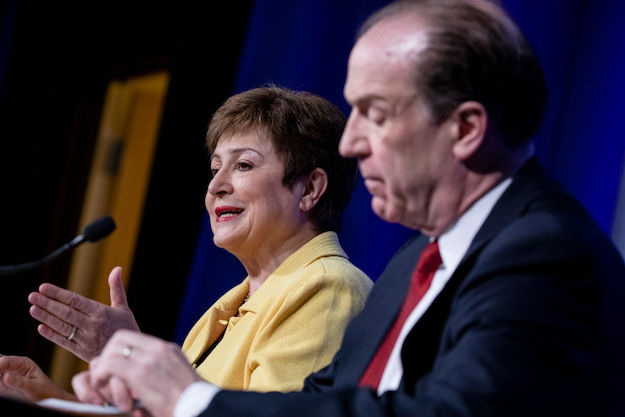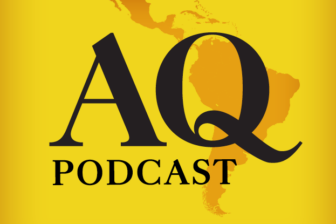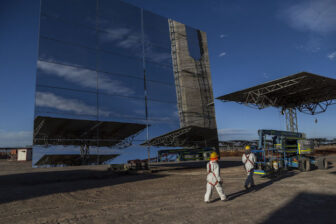Ler em português | Leer en español
SÃO PAULO – We all have witnessed how the pandemic aggravated the toxic mix of extreme inequality and poor public services in Latin America. While cash transfer programs and social distancing measures to combat the pandemic were enacted across the region, polarization and the risk of economic and political instability remain significant.
At first sight, this scenario provides a unique opening for multilateral institutions, such as the Organization of American States (OAS), the Inter-American Development Bank (IDB), the World Bank and the International Monetary Fund (IMF), to show their capacity to provide regional public goods and help countries mitigate the pandemic’s damage. Indeed, recognizing the importance of regional cooperation in tackling the pandemic’s aftermath, many countries in the region have already begun exploring potential means of seeking support from the IDB and the World Bank in their vaccination programs. Furthermore, after four years of Donald Trump’s America First policy, the election of a U.S. president committed to multilateralism and international rules and norms seems to present an ideal moment for strengthening regional institutions.
And yet, formidable obstacles stand in the way. To begin with, Trump may have left the White House, but the leaders of the hemisphere’s second- and third-largest countries hold a profoundly Trumpian view of world affairs. Both Brazil’s Jair Bolsonaro and Mexico’s Andrés Manuel López Obrador are deeply skeptical of institutions that limit their countries’ sovereignty, and neither of the two has articulated a coherent vision for the future of Latin America or hemispheric cooperation. Unless it suits their domestic political purposes, Mexico and Brazil are unlikely to contribute to a meaningful discussion about how institutions like the OAS or other regional institutions can play a stabilizing role. As Brazil’s anti-globalist Foreign Minister, Ernesto Araújo, made clear days before Joe Biden’s inauguration, Trumpism lives on in Brazil. This scenario, by definition, creates a gaping leadership vacuum in the region, one that will be aggravated by the massive domestic challenges awaiting leaders in the coming years, distracting from the need to articulate a more robust foreign policy.
Second, high levels of political polarization threaten to derail attempts at cooperation. The political crises that shook Chile, Ecuador and Bolivia in 2019 showed that regional engagement, rather than reducing tensions, further fanned the flames of polarization. Venezuela’s Nicolás Maduro denounced what he called a military coup in Bolivia and said, without providing evidence, that the United States may have been involved; Ecuadorian and Chilean officials suggested that Venezuelan and Cuban operatives were fomenting political instability in their countries, also without providing any credible evidence. The fact that even OAS Secretary General Luis Almagro embraced this controversial theory only reflected how much the organization had succumbed to the region’s all-encompassing polarization, a trend that predates Almagro’s mandate. No matter where mass protests occur next — and the list of potential candidates is long and includes countries governed by presidents across the ideological spectrum — it seems unlikely that the OAS, or any of the other organizations that have come and gone, such as the now-defunct UNASUR or Prosur blocs, will enjoy the regional support necessary to effectively mediate and reduce tensions.
Finally, there is the return of great power politics to Latin America. This trend, perhaps most visible in the context of the build-up of the region’s 5G networks, will inevitably seep into other areas. Growing tension between the United States and China has now become the dominant geopolitical dynamic in the region, one that complicates U.S. efforts to bolster multilateral fora. In this context, the OAS is unlikely to regain its political relevance: The organization’s decision-making process demands unanimity or large consensus, leaving it easily paralyzed by polarization. The IDB and World Bank, institutions capable of generating positive impacts even amid political tensions, are likely better suited for this new scenario. Still, the controversial election of former Trump advisor Mauricio Claver-Carone as IDB president will make it more difficult for Biden to turn the page.
In this challenging regional scenario, five guiding principles stand out in the quest to revive multilateral institutions in the Americas.
First, given high levels of polarization, the more cooperation can be kept at the bureaucratic and technical level, the better. Attempts at collaboration must be shielded from populist rabble-rousers who would seek to use them for political purposes. The IDB and the World Bank are, again, better suited to such a task, as the OAS and IMF traditionally arouse strong emotions. Second, in this same vein, subnational actors such as governors and mayors should be called upon for support. They are usually far less vulnerable to or interested in political polarization, and thus make more effective interlocutors.
Third, particularly when driven by the United States, bolstering multilateralism in the Americas should not be treated publicly as a means to contain China’s influence in Latin America. Such labeling merely strengthens those who seek to dismiss regional institutions as U.S. puppets rather recognize them as institutions working towards human well-being across the Americas.
Fourth, while Biden is unlikely to replace Claver-Carone as head of the IDB, the incoming U.S. administration should make clear that it is committed to resuming the institution’s tradition of choosing a Latin American as its president. Ideally, the administration should call for a female Latin American successor.
Fifth, efforts to relaunch multilateral cooperation should begin with less controversial issues such as clean energy, coordination around vaccine rollouts or support for migrants from Venezuela and Central America. Issues like the political crisis in Caracas are better postponed until regional institutions regain a minimum of public trust.
Such steps could lay, against all odds, the foundation for a revival of multilateralism in the Americas, helping mitigate the corrosive impact of populist ideology across the region. As Latin American governments take on the lasting damage wrought by COVID-19, effective regional cooperation has never been more important.







